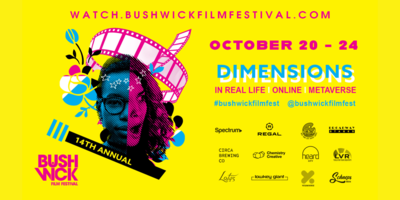Now in it’s 14th year, the Bushwick Film Festival has watched as its namesake neighborhood and the world around it changed dramatically. However, these challenges have not prevented the festival’s organizers from respecting the past while paving a new path forward.
This year’s festival, which ran from October 20-24, is utilizing a hybrid format that includes both live screenings and special virtual events. For Bushwick Film Festival Founder and CEO Kweighbaye Kotee, the 2021 festival is a unique opportunity to reflect on the importance of in-person events as well as the potential that online offerings present.
“I feel like I am still running off the energy from opening night,” Kotee said during an interview. “It was so incredible to see. I kind of forget about how great it was to have a live event, especially after doing a full virtual festival last year.”
The festival’s opening night reception was held at the Lot45 in Bushwick, and included a full red carpet. The filmmakers featured in the festival were invited, giving many an opportunity to meet for the first time in person.
“It was interesting to step back into a live-screening for the first time in a while,” Kotee explained. “I think it was particularly meaningful to the filmmakers, because most of the work they do is behind the scenes.
“A huge part of what they look forward to is showing their film to an audience and feeling the energy of that communal experience,” she said. “It was beautiful to see that return, and it was also nice that it was 75 degrees and sunny on our opening night.”
The pandemic posed a unique set of challenges for Kotee and the Bushwick Film Festival team. However, it is not the first time they have adapted to change.
Since its inception, the Bushwick Film Festival has watched as the surrounding neighborhood changed dramatically. Although Bushwick is more expensive and home to different audiences than it was 14 years ago, Kotee and company continue to showcase artists that reflect the area’s historic diversity and unique character.
“Bushwick is definitely different than it was 14 years ago when I first moved here,” Kotee said, “but it was also different 14 years before that.
“As an immigrant woman and woman of color, I feel a relationship with the immigrant experience of many people in Bushwick and feel a sense of responsibility to make sure the films we select are as diverse as our audience,” she added. “The demographics of those living in Bushwick might be changing today, but we still strive to make a space that is open to people of different backgrounds and can bring people together for the shared love of storytelling.”
The Bushwick Film Festival attracts over 1,500 submissions annually from 60 different countries. Locally, the festival remains committed to community building and offers free public screenings, career-training events, and film production workshops at venues throughout Brooklyn.
During the pandemic, the festival organizers sought out new and creative ways to respect and expand the festival experience.
This year many of those innovations are still on display, including virtual screenings, online conversations between filmmakers and audiences, and a brand-new NFT showcase that includes a curated collection of short films and panels tackling the latest in blockchain trends.
For Kotee, these pandemic-inspired changes helped the Bushwick Film Festival team to better understand what was important about the festival experience.
“It’s funny that some of what we learned during the pandemic was that we didn’t need to do all the things we were doing, Kotee explained. “The most important part of the festival is connecting people together, connecting the filmmakers with each other, connecting the audiences with the stories, and connecting the filmmakers with opportunities within the industry.
With this in mind, we really wanted to focus on a couple outstanding in-person event this year, like our opening night red carpet, while using virtual tools to enhance many of our smaller events,” she added.
The film industry as a whole has experienced many large shifts during the past few decades. Yet for Kotee and her team at the Bushwick Film Festival, change is an opportunity to both remember the past and look to the future.
“I recently talked to these traditional projectionists, who have been working at festivals since the 70s and 80s,” she said. “It was nostalgic to hear their stories about having to run 6,000 feet of film through a projector, but there were also horror stories where none of it would work.
“They knew it was okay to make the process easier sometimes,” Kotee added. “That’s the same balance we are aiming for with this year’s festival.”



